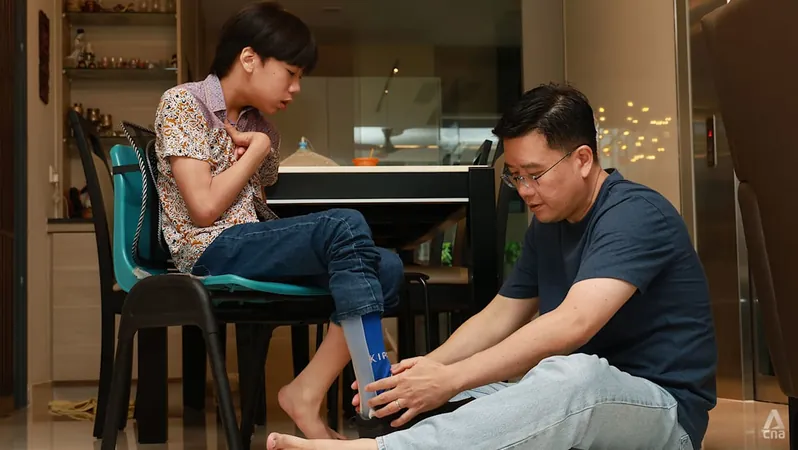
Struggles of Singapore's Working Caregivers: Balancing Work and Family Demands
2025-09-13
Author: Ming
The Hidden Burden of Caregiving
Meet Ms. Jacqueline Ang, a 49-year-old technical manager, who juggles a demanding job while caring for her family—three daughters with special needs and her elderly mother-in-law. Her day begins at 5:30 AM and is filled with relentless responsibilities, from dropping off her twin daughters to their daily activities to managing their care after work. Unfortunately, Ms. Ang's challenges intensified last year after her husband suffered a stroke, adding to her already heavy load.
A Growing Trend Amidst Singapore's Aging Population
As Singapore heads toward becoming a "super-aged" society, more individuals are likely to find themselves in similar situations as Ms. Ang, facing the struggle of balancing careers with caregiving duties. A 2022 study revealed that about 46.3% of caregivers in Singapore are in full-time jobs, highlighting the increasing prevalence of this issue. Mr. Chris Lim from Caring SG notes that many caregivers today are in their 30s to 50s, actively handling both professional responsibilities and caregiving for dependents.
Caregiving: Planned Responsibility or Unexpected Burden?
For most, caregiving is not a choice but a duty often thrust upon them due to a family member's illness or disability. These caregivers often find themselves forced to adjust their careers, stepping back to navigate the demands of their loved ones' needs. Despite these burdens, many report that employment provides them with both financial support and a sense of purpose.
Ms. Ang credits her workplace for the flexibility she's needed; her employer schedules meetings later in the morning to accommodate her commute. In contrast, Ms. Faiza Sanip faced an identity crisis when she had to leave her management role to care for her son with schizophrenia. Although it was a monumental shift, she later found fulfillment after returning to work in a supportive environment.
The Personal Toll of Caregiving
As the demands of caregiving can be physically and emotionally overwhelming, burnout is a common reality. Ms. Faiza recalls a hospital stay due to chronic stress, while Mr. Gabriel Lee had to relinquish an engineering role to assume greater responsibility at home for his son with cerebral palsy. Both emphasize the importance of support systems, whether through hired help or understanding colleagues.
The Need for Systemic Change
As caregiving becomes an expected part of life for so many in their 40s and 50s, employers must recognize these dynamics. Initiatives like the S$10 million Income OrangeAid Grant for caregiver programs emphasize the need for dedicated resources. Other regions, such as some companies in the U.S. and Japan, have already begun implementing caregiver leave and flexible work arrangements.
Community and Support: The Lifelines for Caregivers
A network of peer support can provide invaluable assistance, as many caregivers relate to the unique challenges each faces. Mr. Anand Lal highlights informal WhatsApp groups for advice and encouragement, emphasizing the importance of seeking help. Similarly, Ms. Ang's willingness to communicate her caregiving role has garnered support from her colleagues, contributing to her resilience.
Conclusion: Redefining Caregiving in Society
As the narrative around caregiving evolves, it’s clear that public and workplace recognition is essential. Caregivers need validation for their dual roles and support in managing both work and family life. While challenges abound, sharing experiences and building community resilience can truly make a difference in their lives. Ultimately, recognizing the caregiving role can turn barriers into opportunities for understanding and collective growth.



 Brasil (PT)
Brasil (PT)
 Canada (EN)
Canada (EN)
 Chile (ES)
Chile (ES)
 Česko (CS)
Česko (CS)
 대한민국 (KO)
대한민국 (KO)
 España (ES)
España (ES)
 France (FR)
France (FR)
 Hong Kong (EN)
Hong Kong (EN)
 Italia (IT)
Italia (IT)
 日本 (JA)
日本 (JA)
 Magyarország (HU)
Magyarország (HU)
 Norge (NO)
Norge (NO)
 Polska (PL)
Polska (PL)
 Schweiz (DE)
Schweiz (DE)
 Singapore (EN)
Singapore (EN)
 Sverige (SV)
Sverige (SV)
 Suomi (FI)
Suomi (FI)
 Türkiye (TR)
Türkiye (TR)
 الإمارات العربية المتحدة (AR)
الإمارات العربية المتحدة (AR)